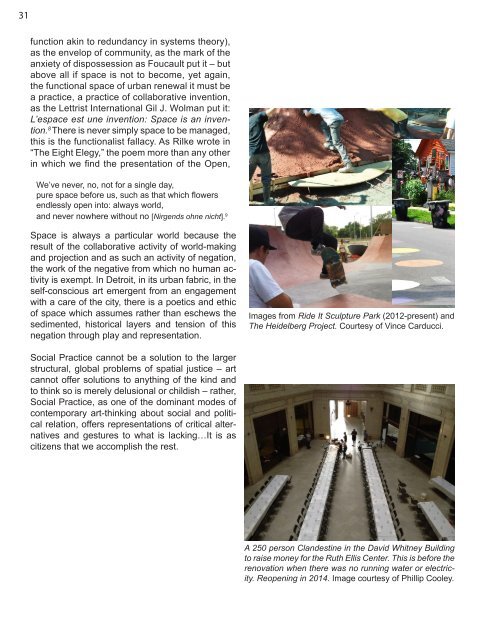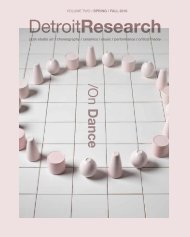Detroit Research Volume 1
You also want an ePaper? Increase the reach of your titles
YUMPU automatically turns print PDFs into web optimized ePapers that Google loves.
31<br />
function akin to redundancy in systems theory),<br />
as the envelop of community, as the mark of the<br />
anxiety of dispossession as Foucault put it – but<br />
above all if space is not to become, yet again,<br />
the functional space of urban renewal it must be<br />
a practice, a practice of collaborative invention,<br />
as the Lettrist International Gil J. Wolman put it:<br />
L’espace est une invention: Space is an invention.<br />
8 There is never simply space to be managed,<br />
this is the functionalist fallacy. As Rilke wrote in<br />
“The Eight Elegy,” the poem more than any other<br />
in which we find the presentation of the Open,<br />
We’ve never, no, not for a single day,<br />
pure space before us, such as that which flowers<br />
endlessly open into: always world,<br />
and never nowhere without no [Nirgends ohne nicht]. 9<br />
Space is always a particular world because the<br />
result of the collaborative activity of world-making<br />
and projection and as such an activity of negation,<br />
the work of the negative from which no human activity<br />
is exempt. In <strong>Detroit</strong>, in its urban fabric, in the<br />
self-conscious art emergent from an engagement<br />
with a care of the city, there is a poetics and ethic<br />
of space which assumes rather than eschews the<br />
sedimented, historical layers and tension of this<br />
negation through play and representation.<br />
Images from Ride It Sculpture Park (2012-present) and<br />
The Heidelberg Project. Courtesy of Vince Carducci.<br />
Social Practice cannot be a solution to the larger<br />
structural, global problems of spatial justice – art<br />
cannot offer solutions to anything of the kind and<br />
to think so is merely delusional or childish – rather,<br />
Social Practice, as one of the dominant modes of<br />
contemporary art-thinking about social and political<br />
relation, offers representations of critical alternatives<br />
and gestures to what is lacking…It is as<br />
citizens that we accomplish the rest.<br />
A 250 person Clandestine in the David Whitney Building<br />
to raise money for the Ruth Ellis Center. This is before the<br />
renovation when there was no running water or electricity.<br />
Reopening in 2014. Image courtesy of Phillip Cooley.





